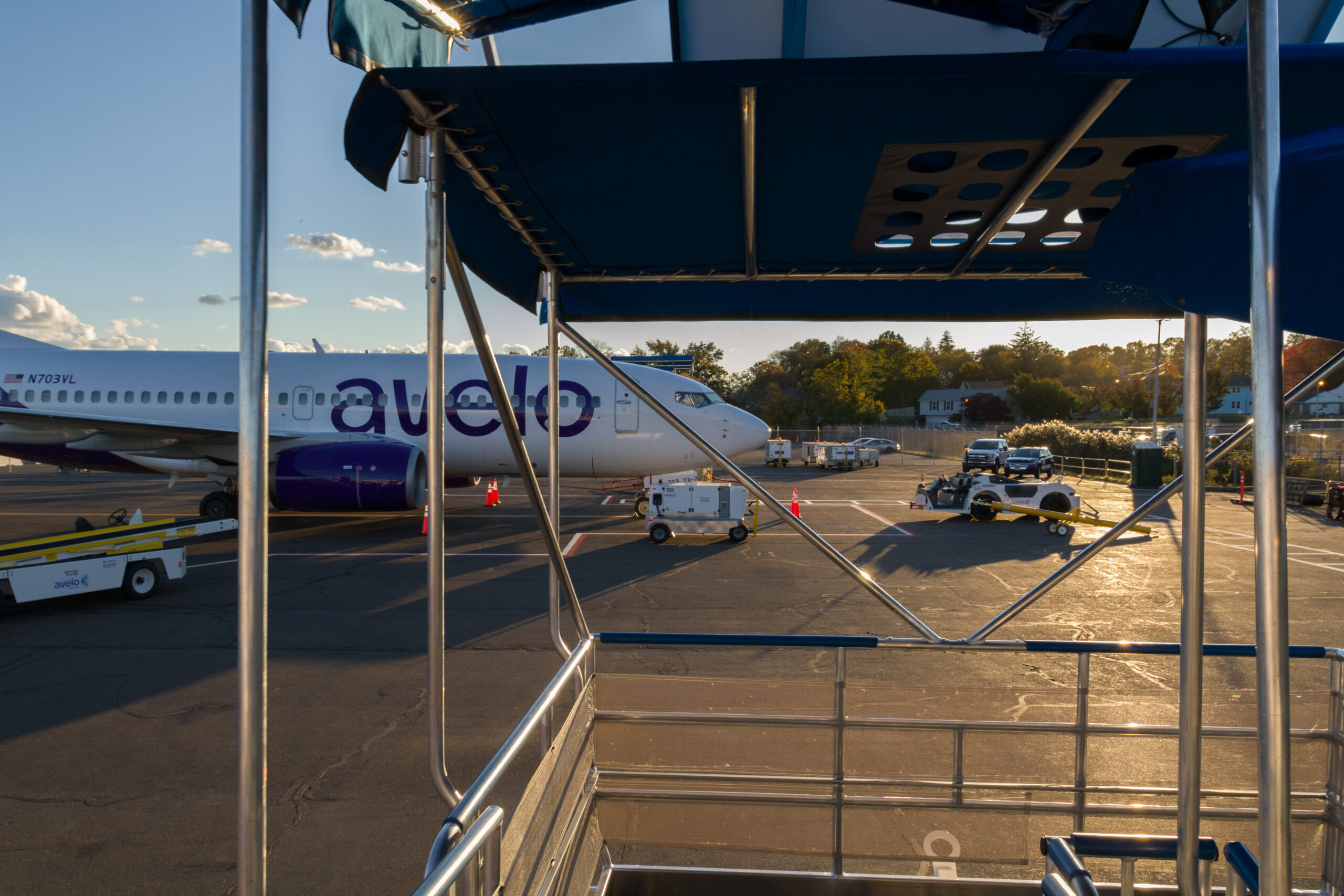Airport expansion close at hand, with environmental permits pending
Tweed New Haven Airport presented an environmental mitigation plan to the Connecticut Department of Energy and Environmental Protection last month, even as opposition from community members remains fierce.

Zoe Berg
Tweed New Haven Airport submitted an environmental permit application to a Connecticut environmental agency on April 30, marking another step towards the completion of the airport’s expansion project.
Local environmental activists and many of the airport’s neighbors in East Shore continue to vocally oppose the plan. Avelo Airlines, Tweed’s biggest carrier, has also come under fire in recent weeks for a contract with the U.S. Department of Homeland Security to conduct deportation flights from Arizona. The flights began on Monday.
The expansion would entail lengthening the runway from 5,600 to 6,575 feet, as well as a new East Terminal, with new parking facilities and roads for passengers. The project was announced in May 2021, about six months before Avelo began operating at the airport. Since the announcement, passenger traffic through the airport has grown by almost twenty times.
In a statement on April 30, Tweed declared the submission of the permit applications — to the Department of Energy and Environmental Protection — “a major step forward in Tweed-New Haven Airport (HVN)’s nearly century-long effort to unlock new opportunities for Southern Connecticut through expanded air service and improved transportation infrastructure.” The press release also emphasized the airport’s commitment to the environment and flood management.
The proposed plan includes promises to preserve and restore wetlands surrounding the airport facility and to monitor the nearby ecosystem. Additionally, the airport claims that the shorter airplane taxi distances resulting from the expansion will reduce air pollution.
In recent years, environmentalists have questioned the impacts of the airport expansion, including evidence in a report on potential PFAS contamination, which does not quickly integrate into the environment. They would like to see an Environmental Impact Statement produced by the federal government.
Andrew King, a spokesperson for Avports, the company that manages Tweed, said the changes coming to the airport will help make the airport more environmentally friendly.
“Our goal has been to build a carbon-neutral terminal with carbon-neutral ground operations,” King said.
This would require a micro-grid for electricity and the electrification of fuel-based ground operations. Tweed is also the first airport in the country that is moving towards hydrogen-powered ground vehicles, King added.
But the plan is not without controversy.
Carolyn Rostkowski, an East Shore resident who lives in close proximity to the airport along Fort Hale Road, said she is concerned about how the extension of the runway and construction of new facilities on wetlands would impact the environment.
“Everything goes right into the Long Island Sound, which in my lifetime has cleaned up significantly,” Rostkowski said.
In November, the environmentalist organization Save the Sound appealed the Federal Aviation Administration’s finding that the expansion would have “no significant impact” on the environment.
“The FAA has failed to meaningfully analyze and mitigate significant impacts of the proposed expansion, despite the fact that the airport is located in a floodplain, in a residential neighborhood, and in a state-designated environmental justice area,” Jessica Roberts, an attorney with Save the Sound, said in a statement at the time.
Gloria Bellacicco, an East Shore resident, agrees with Roberts’ assessment. Bellacicco said that bird migration pathways come near the airport.
Tweed has had a more rigorous environmental approval process than other comparable airports, King insisted, due to the level of public interest in the expansion. The FAA, he added, has a “very strong track record” with its approval process.
King said the Environmental Impact Statement that activists want would not be more rigorous than the already completed FAA Environmental Assessment, which he said was the “gold standard for understanding and projecting the environmental impact of the airport.”
Rostkowski said she remains concerned about the increased air traffic that the expansion of the airport could bring. She described the noise of aircraft at peak hours as nonstop and complained about fumes and dirt that have resulted from the increased vehicle and airport traffic.
“My curtains are black,” Rostkowski said.
King said the project will decrease noise and air pollution, because the terminal will be “moved into the middle of what is essentially a field,” farther from nearby homes.
“HVN is growing very quickly. To do nothing is completely irresponsible. The only responsible thing to do is to move the project forward as quickly as possible,” King wrote the the News.
Rostkowski fears that federal cuts from the Trump administration might lead to less stringent regulation of the project if federal agencies might not “do the due diligence before just charging ahead,” she said.
Approval of the environmental permits by the Connecticut Department of Energy and Environmental Protection is one of the final hurdles before groundbreaking.
The Tweed New Haven Airport Authority has scheduled six additional public meetings to discuss the project.
Interested in getting more news about New Haven? Join our newsletter!







